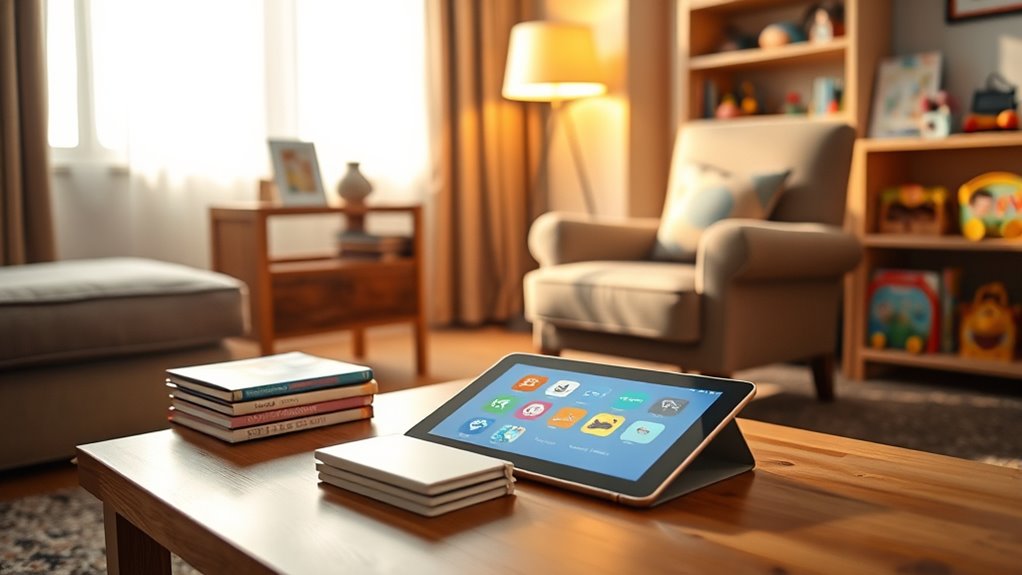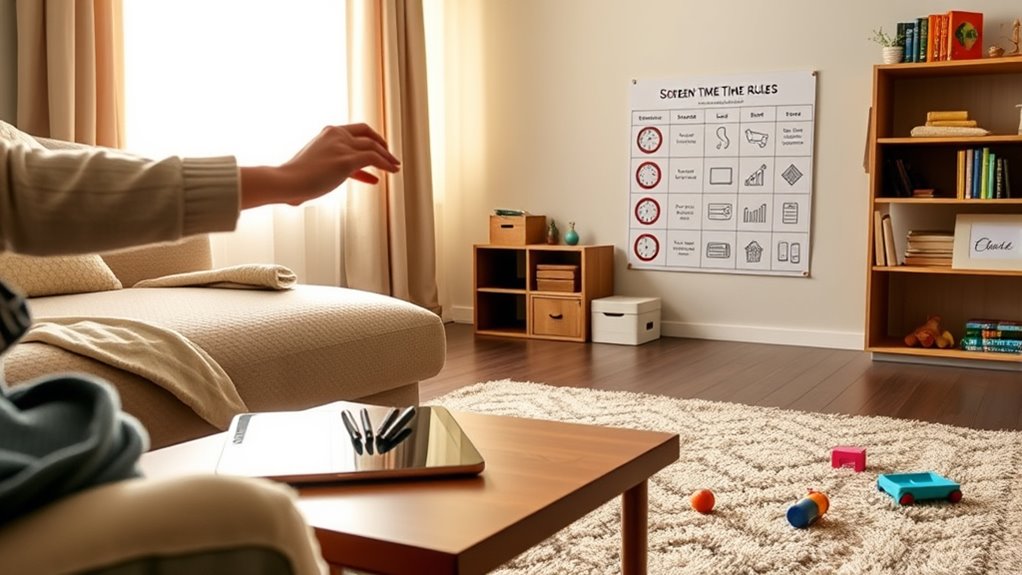Pediatricians often apply simple yet effective screen time rules at home to promote healthy habits. They set clear boundaries like designated screen-free zones, limited daily usage, and specific times for digital activities. Consistency is key, so they communicate openly about why these limits matter—focusing on well-being and fostering face-to-face interactions. By modeling good digital behavior themselves, they encourage children to follow suit. Keep exploring to discover more practical tips pediatricians quietly recommend for a balanced digital life.
Key Takeaways
- Enforce consistent screen time limits after homework and chores to promote balanced daily routines.
- Designate screen-free zones like bedrooms and dining areas to reinforce boundaries.
- Model responsible digital behavior, such as putting phones away during family interactions.
- Involve children in creating and understanding tech policies to foster cooperation.
- Regularly review and adapt screen rules as children grow and technology advances.

As pediatricians, setting clear screen time guidelines is essential to promoting healthy development in children. One of the most effective ways to do this is by establishing firm digital boundaries that help kids understand when and how they can engage with screens. These boundaries aren’t just about limiting time; they’re about creating a balanced environment where technology enhances learning and connection without taking over. To achieve this, many pediatricians secretly implement family tech policies that everyone in the household follows, ensuring consistency and fairness. These policies might include designated screen-free zones, such as bedrooms and dining areas, to reinforce boundaries and encourage face-to-face interactions. By setting these limits, you help your children develop self-regulation skills and reduce the risk of overexposure to digital media.
Creating and enforcing digital boundaries starts with clear communication. Children need to understand why limits are in place, which promotes cooperation rather than resistance. As a parent, you might explain that screens can be fun and educational but should be used responsibly. You can also set specific times for screen use, such as after homework and chores are completed, to promote a sense of routine. Family tech policies should be consistent; for instance, if you decide no screens during dinner, stick to it. Consistency helps children internalize these rules and understand that boundaries are about their well-being, not punishment. Incorporating attention to detail into your approach ensures that rules are clear and effectively communicated. Additionally, understanding the importance of data privacy challenges, even in daily routines, can help you teach your children about responsible digital behavior. Moreover, understanding local resources and tools available for digital safety can further support your efforts in guiding responsible screen use. Being aware of the potential for eye strain or discomfort from prolonged screen exposure can also help you educate your children about healthy habits.
Incorporating family tech policies into daily life also means modeling good digital behavior yourself. Kids often mimic adults, so when you put your phone away during family time or avoid screens before bed, you reinforce the importance of healthy habits. Additionally, you can involve your children in creating these policies, giving them a sense of ownership and understanding of their importance. For example, you might agree on a certain amount of daily screen time or jointly decide on which apps are appropriate. This collaborative approach makes rules feel less restrictive and more like shared goals.
Beyond setting rules, it’s essential to regularly review and adjust your family’s tech policies as kids grow and technology evolves. Keep the lines of communication open, and be willing to adapt boundaries to fit changing needs. Remember, your goal is to cultivate a healthy relationship with technology that supports your child’s overall development. By actively managing digital boundaries and implementing consistent family tech policies, you create a safe, balanced digital environment where your children can thrive without being overwhelmed by screens. This proactive approach not only aligns with pediatric advice but also empowers your kids to develop responsible digital habits that will serve them well throughout their lives.
Frequently Asked Questions
Do Pediatricians Allow Their Children Unlimited Screen Time?
You might wonder if pediatricians allow their children unlimited screen time. While some may be more lenient, most follow screen time moderation principles, adhering to pediatric screen policies that promote balanced use. They set boundaries to ensure their kids enjoy digital devices responsibly, prioritizing outdoor play, homework, and family time. So, even pediatricians recognize the importance of moderation, teaching children healthy habits that prevent excessive screen exposure.
How Do Pediatricians Handle Screen Time During Family Vacations?
During family travel, you handle screen time by setting clear boundaries, like establishing screen-free zones and times. You might allow limited device use for entertainment or navigation, but prioritize quality time together. To keep kids engaged, plan activities that don’t involve screens, such as outdoor adventures or games. This approach helps maintain balance, promotes family bonding, and guarantees everyone enjoys the trip without excessive screen exposure.
Are There Specific Apps Pediatricians Recommend for Monitoring Kids?
You might wonder if pediatricians recommend specific apps for monitoring kids. They often suggest using parental control apps to set time limits and block inappropriate content. Additionally, they favor educational tools that promote healthy screen habits. These apps help you stay engaged with your child’s digital activity, ensuring balance and safety. Remember, combining technology with open conversations creates the best environment for your child’s healthy screen time habits.
Do Pediatricians Ever Bend Their Own Screen Time Rules?
You might think pediatricians strictly follow their own screen time rules, but they often bend their professional boundaries with a dash of parental flexibility. Ironically, they understand that perfect adherence isn’t always realistic. They may let their kids watch a bit longer or use screens more freely at home, knowing that balancing discipline and understanding is key. After all, even experts know that a little flexibility can sometimes be the best approach.
How Do Pediatricians Balance Screen Time With Outdoor Activities at Home?
You can balance screen time with outdoor activities by setting clear limits on electronic devices and encouraging physical activity. As a parent, you might designate specific times for screen use and make sure your child spends plenty of time outside. This way, they get the benefits of outdoor play while still enjoying electronic devices responsibly. Creating a routine helps your child develop healthy habits that blend technology with physical activity naturally.
Conclusion
By following these screen time rules, you’re steering your child’s habits like a captain steering through calm waters. Remember, setting clear boundaries helps your kids develop a healthy relationship with screens, just as a gardener tends to delicate plants. Keep consistency and patience in mind, and watch their digital habits grow strong and balanced. With these tips, you’re not just managing screen time—you’re planting seeds for a healthier, happier future.









